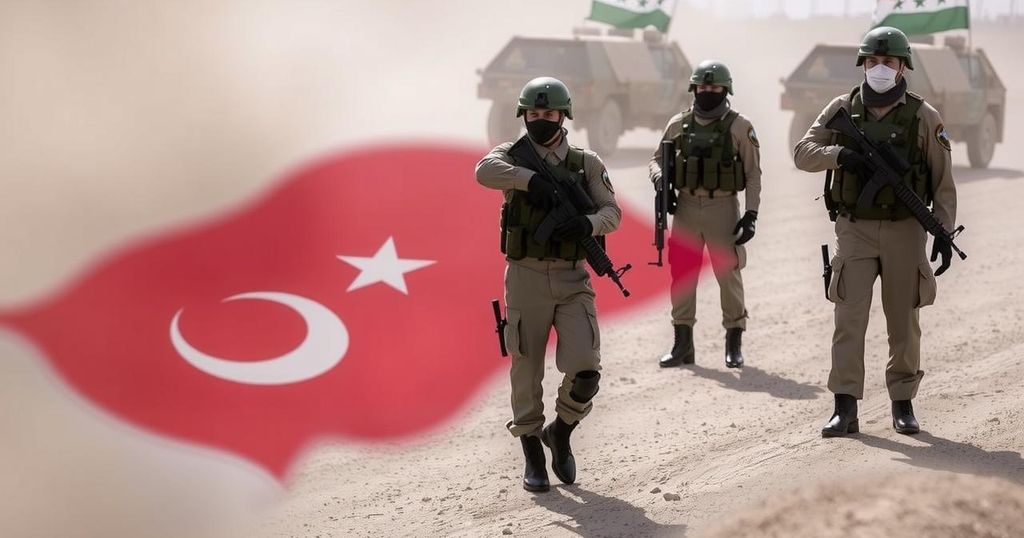World news
ASIA, BASHA, BASHAR AL - ASSAD, DAMASCUS, EUROPE, EUROPE/ASIA, EUROPEAN UNION, FIGHTER JETS, FRANCE, HA, HAKAN FIDAN, ISLAMIC STATE MILITANTS, KURDISTAN WORKERS PARTY, MANBIJ, MAZLOUM ABDI, MILITARY ACTIONS, MILITARY OPERATIONS, NATO, PKK, SD, SDF, SYRIA, SYRIAN CIVIL WAR, SYRIAN CONFLICT, SYRIAN DEMOCRATIC FORCES, TURKEY, WAR, YPG
Marcus Chen
0 Comments
Turkey’s Assertive Stance on Kurdish Militias Amid Syrian Turmoil
Turkish Foreign Minister Hakan Fidan stated that Turkey will take necessary actions to ensure its security if Syria does not resolve concerns about Kurdish militants, particularly the YPG. Following the recent changes in Syria, Fidan calls for the disbandment of the YPG, which Ankara regards as terrorist-linked. He warns that Turkey may resort to military intervention if the new Syrian administration fails to respond to these issues.
On December 21, 2023, Turkish Foreign Minister Hakan Fidan declared that Turkey will undertake “whatever it takes” to ensure its security if the newly formed Syrian administration fails to adequately address Ankara’s concerns regarding Kurdish militant groups, which Turkey views as terrorist organizations. Fidan emphasized the urgency for the new Syrian leadership to disband the YPG, aligned with the US-backed Syrian Democratic Forces (SDF), which Turkey considers an extension of the Kurdistan Workers Party (PKK).
Following the recent overthrow of Bashar al-Assad, Turkey has heightened its military activities, notably seizing control of Manbij from the SDF. This swift shift in regional dynamics has pressured Kurdish factions that previously consolidated power over the past decade. In an interview with France 24, Fidan reiterated that Turkey’s preferred course is for the new administration in Damascus to resolve the issue while maintaining Syria’s territorial integrity. If not addressed, he posited that Turkey may need to take necessary measures, including military action.
In light of Mustafa Abdi, the SDF commander, suggesting a need for negotiations with Ankara, Fidan advised instead that the Kurdish groups should initially seek discussions with Damascus amidst this changing reality. Turkey has engaged in numerous cross-border operations against the SDF and persistently urged the United States to terminate its support for these groups, despite their prior significant role in combating ISIS from 2014 to 2017. Fidan criticized the recent increase of US troops in Syria, viewing it as unjustified, while contending that the focus against ISIS should solely be on the management of captured fighters.
Furthermore, Fidan noted prior collaboration between Turkey and various Syrian factions, such as Hayat Tahrir al-Sham, in counter-terrorism efforts, while reaffirming Turkey’s opposition to any foreign military presence in Syria, particularly Russian bases, leaving the ultimate decision to the Syrian populace.
The ongoing conflict in Syria has significantly complicated Turkish-Syrian relations, especially concerning the Kurdish groups active in the region. The YPG, viewed by Turkey as a domestic threat associated with the PKK, has been a focal point of Turkish national security concerns since the outbreak of the Syrian Civil War. The recent political shifts, particularly with Assad’s regime losing control, have left a power vacuum that has escalated hostilities and prompted Turkey to increase its military presence and operations in northern Syria. The role of the US and its backing of the SDF has been contentious, complicating Turkey’s collaborations and strategies in the region.
In conclusion, Turkey remains firm on its stance regarding the YPG and the security challenges posed by Kurdish groups in Syria. Hakan Fidan’s assertions illustrate Turkey’s willingness to resort to military actions if necessary, emphasizing the urgency for the new Syrian administration to promptly address these concerns. The geopolitical landscape following the Assad regime’s decline continues to evolve, and Turkey’s approach to Kurdish forces and their alignment with US interests will remain critical in shaping future regional dynamics.
Original Source: www.euractiv.com




Post Comment